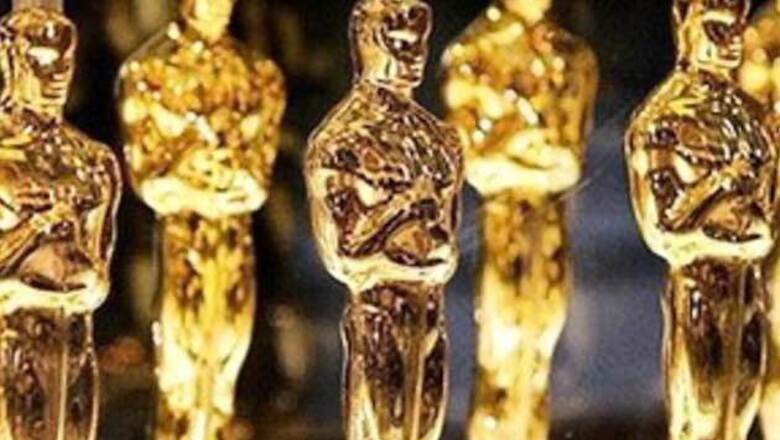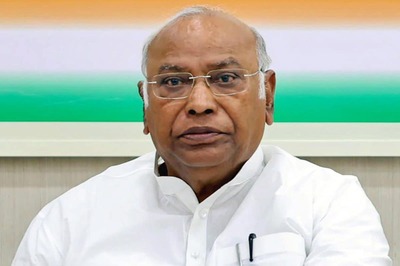
views
The Academy Awards are usually tightly scripted events, but sometimes even Oscar gets a taste of the unexpected. Here are some of the curious moments when things veered off course on the red carpet.
REFUSING OSCAR
A few Oscar winners have felt compelled to turn down their prizes over the years. The first was screenwriter Dudley Nichols, who refused his Best Screenwriter award for 'The Informer' in 1936 because of conflicts between the Screen Writers Guild and the Academy. Marlon Brando famously sent a proxy to refuse his 1972 Best Actor Oscar for 'The Godfather' on his behalf (and to deliver a 15 page speech on Hollywood's mistreatment of Native Americans while she was there).
The all time greatest rejection, though, goes to George C Scott, who denounced his Best Actor nomination for 'Patton,' calling the awards "offensive, barbarous and innately corrupt." Scott was quoted as calling the ceremonies 'a two-hour meat parade', a public display with contrived suspense for economic reasons." When he won the award, he was 3,000 miles away at home, watching a hockey game on TV. Brilliantly, Scott's high moral tone was strangely absent when, two years later, he let it be known that if the Academy felt like nominating him for Best Director for 'Rage', he wouldn't object. Unsurprisingly, they didn't much feel like it.
Ten years later, Scott was so keen on the idea of an offensively barbarous two hour meat parade that he bought last-minute tickets for the 1982 ceremony, and would have gotten away without incident had he not been spotted by a columnist from Variety and heckled on the red carpet.
A LONG WALK TO THE STAGE
Hattie McDaniel was the first African-American to win an Academy Award, for her portrayal of Mammy in the 1939 film 'Gone With The Wind' - as mentioned by George Clooney in his 2006 'Isn't Hollywood progressive?' Oscars speech.
What he didn't mention was that, while the rest of the cast and crew of 'Gone with the Wind' sat at a big table together, McDaniel and her companion were seated at a table for two in the back of the room, as the Ambassador Hotel was still segregated. And it was from all the way at the back of the room that she had to walk to accept her award with, one has to say, a very gracious speech under the circumstances. So, progressive, but not all that progressive, eh, George?
MINISKIRT BAN
In her 1967 classic 'How to Dress for Success', Oscar-winning designer Edith Head said, "Even the most beautiful legs - Marlene Dietrich's, for instance - look better when the kneecap is covered." To back up the sentiment, Head, who served as a special adviser to the Academy, banned miniskirts from the 40th Academy Awards in 1967, saving the nation from the indignity of knees it suffered in 1966 (like the shocking mid-leg areas of Inger Stevens)
THE STREAKER
Daring to show a little more leg (and a lot more of everything else) than even the poor, oppressed miniskirt lovers of 1967 was Robert Opel, who in 1974 became the only person to have appeared naked onstage at the Oscars. Sadly, he wasn't a daring nominee, or even a presenter - just some guy who really liked being naked. "Isn't it fascinating to think that probably the only laugh that man will ever get in his life is by stripping off his clothes and showing his shortcomings," quipped David Niven, securing his place in dictionaries of hilarious quips forevermore. Of course, it was later suggested that the streak had been arranged by the producers to spice up a boring run of ceremonies, and that Niven has been seen to borrow a pencil to note down his spontaneous line before the show had even begun, but it's far more fun to believe the opposite.
THERE'S NO HOSTING LIKE ... WELL, NO HOSTING
There have been good hosts, bad hosts, really bad hosts and really, really bad hosts, but the all-time worst ceremony was one with no host. Few people who saw the 1989 awards show's opening number - a duet between an actress playing Snow White and non-singer Rob Lowe - will ever forget it. ... no matter how much they might want to, or how hard they might try. It wasn't the first time the show had gone without a host; there was a three-year run in the late '60s after Bob Hope's tenure, when no one could follow his masterful act. But 1989 was the last time that happened.
BANNED!
After the Academy caught wind of Sasha Baron Cohen's plan to turn up dressed as his leading role in 'The Dictator', rumors flew in the weeks leading up to the 2012 Oscars that Baron Cohen would be barred from the ceremony. The Academy, however, said he had never been banned, just warned that the red carpet was no place for stunts. Apparently, Baron Cohen didn't get the message; he arrived in full costume, carrying an urn containing, he said, the ashes of Kim Jong-il, which he then proceeded to spill over Ryan Seacrest before being escorted off the premises. Actual bans from the Oscars are harder to come by - but not impossible. Just ask Nicholas Chartier, who was reportedly the first nominee ever to fall that far afoul of Oscar, for sending an email to a group of people including Academy members encouraging them to support the film he produced ('The Hurt Locker') and disparaging another nominated film.
VALUE OF THE WORLD'S MOST FAMOUS STATUETTE: $1
Much to the disappointment of some faded stars, there's no profit to be made from an old Oscar. Since 1950, the Academy has made every recipient of the little golden man sign a 'winner's agreement'. If you fall out of love with fame and one day wish to sell you statuette, you have to offer it to the Academy first for $1. That doesn't mean that Oscars never surface in auctions - Steven Spielberg has spent more than $1.1 million on two used pre-winner's-agreement Oscars - Clark Gable's in 1996 and Bette Davis' in 2001, in order to return them to the Academy. There's nothing someone with a shelf of real Golden Men likes less than someone else trying to buy their way into the club.
THE SHIFTING STATUETTE
The modern award is 13.5 inches high, weighs 8.5 pounds (3.85 kilograms) and is made of gold-plated britannium, a pewter-like alloy, on a black metal base. But it has not always been so. Before World War Two, the base was stone; during the war, statuettes were made of plaster as a nod to the war effort (though winners could swap them for metal ones once the war was over).
Until the 1950s, child actors who won Oscars were given miniature statuettes. This was not because they were too tiny and weak to carry the big ones off the stage but because it was thought unfair to the adults that they would have to compete with kids.
When ventriloquist Edgar Bergen and his dummy Charlie McCarthy got an honorary Oscar in 1938, he was given a wooden Oscar statuette with a movable mouth.
AUSTERITY OSCARS
In 1944, as part of the war effort, the Academy took the 16th Academy Awards to Grauman's Chinese Theater, the first time for the Oscars in a big public venue. Men and women in uniform were given free tickets for the ceremony, and in a show of solidarity some were given seats on the stage. However, as this video will attest, some of them did look a little bored.
THE OSCARS' OSCAR
The late Walt Disney currently holds the record for winning the most, with 26 awards given to him personally (22 Oscars, three Special Awards and the Irving G Thalberg Memorial Award).
On the flip side, sound re-recording mixer - it's a real job, apparently - Kevin O'Connell has been named the Oscar's most unlucky nominee, having been nominated 20 times without winning.
Meanwhile, there has only ever been one Oscar to win an Oscar. Songwriter Oscar Hammerstein II, fittingly, won two.




















Comments
0 comment